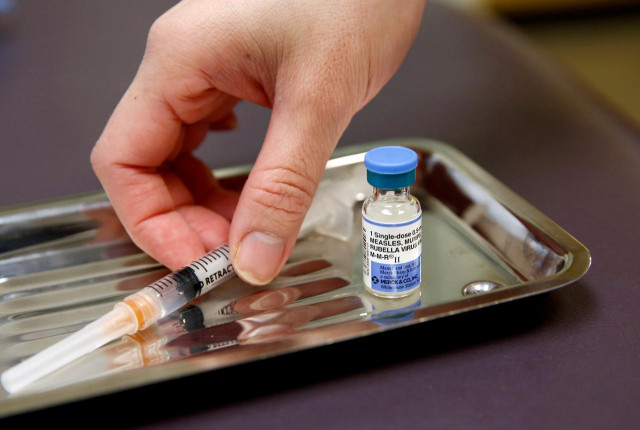New vaccine found to fight XDR typhoid in children
Sindh-wide immunisation drive planned to cover missed children in March

A Reuters illustrative image showing vaccine for viruses.
Over 10,000 cases of extensively drug resistant (XDR) typhoid have been reported in Karachi and Hyderabad since 2016. As a result, an emergency vaccination drive was conducted in Hyderabad's worst affected areas in 2018, administering the vaccine to 207,000 children under the age of 10.
Over the next 18 months, researchers monitored over 20,000 of these children. They found that 9 out of 10 children in their study did not contract the disease.
Dr Farah Qamar, a paediatrics and child health professor at AKU, stated that the findings corroborated those of another study in Nepal, adding that this strengthened the case for rolling out the vaccine across the country. She also discussed how lessons from the Hyderabad campaign had been applied in other areas of Sindh.
Now, another provincial campaign is being planned to immunise children between the ages of 9 months and 15 years, who had previously been missed, in March. According to the researchers, parents of missed children were keen to have them vaccinated.
Meanwhile, Expanded Programme of Immunisation Punjab director Dr Muhammad Saeed Akhtar noted that cases of drug-resistant typhoid had emerged in parts of Punjab, such as Lahore and Multan. He said that the Punjab government planned to include the vaccine in its routine immunisation programme later this year, adding that it would keep in mind the lessons learned from the drives in Sindh.
Dr Anita Zaidi, from the Bill and Melinda Gates Foundation, stressed that any strategy to combat typhoid would require an integrated approach, covering not just vaccination but also access to clean water and improved sanitation.
Researchers from AKU also explained how they, in collaboration with Hyderabad health officials, had been able to trace the cause of the typhoid outbreak.
"Our research involved geographic mapping, which highlighted how the majority of cases were reported around sewage lines," revealed Dr Momin Kazi, another paediatrics and child health professor at AKU. "Household water samples also tested positive for contamination, showing that the drinking of contaminated water was the most likely cause for the outbreak."
Controlling and preventing water-borne diseases such as typhoid is a global health priority, with the Sustainable Development Goals calling for their eradication by 2030.
Published in The Express Tribune, February 25th, 2020.


















COMMENTS
Comments are moderated and generally will be posted if they are on-topic and not abusive.
For more information, please see our Comments FAQ